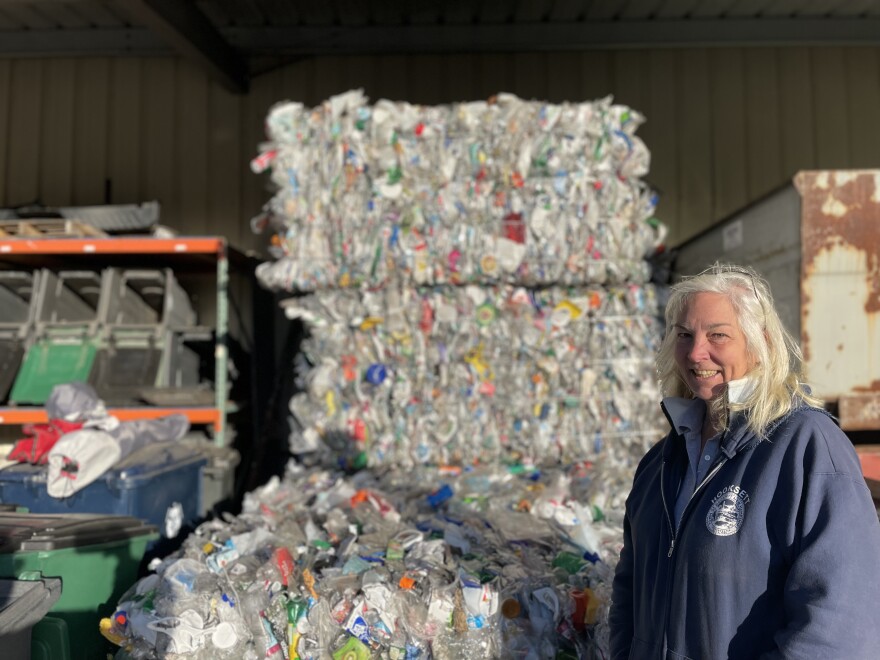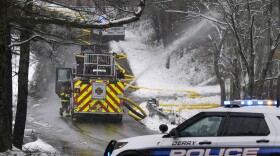The transfer station in Derry is full of neatly organized piles of everything residents don’t want. Old couches, discarded Halloween decorations, and tidy mounds of plastic, cardboard, glass, and aluminum.
Mike Fowler, the director of public works for the town of Derry, says it wasn’t always this way. In 1991, the town passed an ordinance to make recycling mandatory, just as the transfer station built in the early 1980s was starting to overflow.
The goal was to cut down on the amount of trash that had to be put into a landfill or an incinerator. “Everybody just threw it into cans or bags, and it just all went into the trash stream,” Fowler said. "But as time went on, people understood that they could separate their paper or their cardboard, and we started to find markets for that and made a little bit of money.”
He says that money has helped the town offset taxes. And right now, Derry and other towns are making a lot of money off recycling. Fowler says the prices municipalities are able to get are about double what they were four years ago, which is good for the bottom line in Derry’s town budget.
This is a big change. Not that long ago, some towns were looking at shutting their recycling operations down.
In 2018, China made the decision to stop accepting a lot of recyclables – especially those that were contaminated – from the US and other places. That left communities in the US scrambling for markets where they could sell their recyclable goods.
“What a lot of people last heard about recycling was that recycling was dead, recycling wasn't working anymore and that communities were stopping recycling,” said Reagan Bissonnette, the executive director of the Northeast Resource Recovery Association.
Bissonnette said there are a number of reasons the market for recyclables has improved. One reason is the pandemic.
Bissonnette says large businesses and schools stopped generating large amounts of recyclables, and as they stopped getting those reliable shipments, domestic paper mills were willing to pay more for local recycling. Bissonnette says those paper mills have seen a lot of recent investment.
“We're really developing a more robust domestic infrastructure for recycling, which should be able to take up any additional feedstock that is going to come as businesses and schools come back online,” she said.
Over the past few years, other changes have made recycling more stable in New Hampshire.
A few years ago, it was costing Hooksett twice as much to recycle as it was to just send trash to the landfill. Like many communities, Hooksett had a single-stream system, where people put mixed recycling in bins that the town picked up. The town changed that to a system where people sort their own recycling at the dump.
Denise Cumings, the crew chief at the Hooksett Transfer Station, says she’s seen a positive response from residents.
“The residents have progressively gotten very good at coming here, and bringing their cardboard especially,” she said.
Cumings says their recycling is cleaner now, and makes Hooksett more money. And the dump has become sort of a community space. Dozens of Tonka trucks line the walls of the recycling building, and discarded holiday decorations find a new life. There’s a garland hanging over the station for cardboard, which has become particularly valuable as people have started to order more goods online.
Prices for cardboard were as low as $25 per ton last year, and reached $155 last month, Cumings said.
“When I get checks for $30,700 dollars, that goes back to the town,” she said.
In Gilford, aluminum cans saw a big jump. The price the town could get for 10 tons of cans almost doubled in the past year, going from $7,000 to $13,000, said Meghan Theriault, the director of public works.
Plastic has also seen increases as the price of oil has gone up. Plastics are made from oil, and things like old milk jugs were selling well in the fall.
Kevin Reed is a Hookset resident who comes to the transfer station with his dog. He says coming here gets him out of the house, and it feels good.
“I have a child, I think that helps out a lot, so I give her hopefully a better, better world. Not looking good, but I can do my little part,” he said.
Even with widespread recycling programs, people in New Hampshire still send well over a million tons of trash to the landfill every year. Landfill expansions have been controversial in the state, and all of that has some thinking differently about how we manage our waste.
Marc Morgan, solid waste manager for the town of Lebanon, is looking beyond recycling. His transfer station has composting for food waste, and offers tips to help households cut down on both trash and recyclable waste.
“Here in Lebanon, for the last three or four years, we've been promoting the idea of waste reduction to eliminate waste, not generate it in the first place,” he said.
Morgan says prices for recycling are pretty good right now, but he’s already seeing them begin to level off. With the shift in international markets and supply chain disruptions, the whole industry is going through big changes, he said. And like other markets, prices will always fluctuate.
Morgan and Reagan Bissonnette are part of a new state commission, the Solid Waste Working Group, that’s planning for New Hampshire’s waste-management future. The group has until 2026 to submit their final report, but will submit an initial report in a little less than a year.
Morgan thinks recycling will always be an option for Granite Staters. But, he says, reduction may become the new word of the day.








